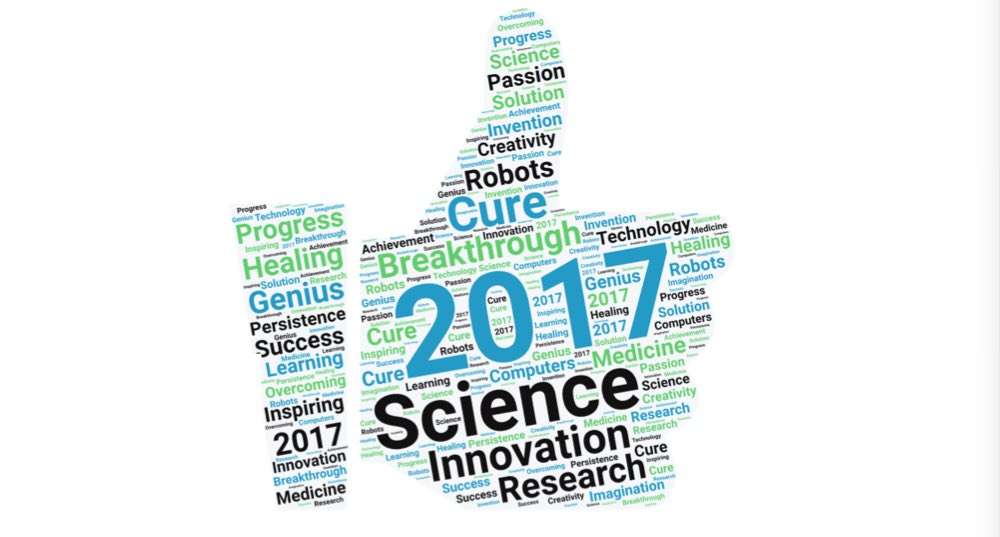Star Wars-Inspired Bionic Hand Allows Amputee to Play the Piano For First Time in 5 Years
"It's completely mind-blowing," said the musician. "I never thought we'd be able to do this."

Some may only recall this year as a year of personal or political frustration, so we're going to remind you that2017 brought to life some fascinating revelations and scientific breakthroughs.
We've reviewed our archives and collected the most eye-opening and click-worthy articles. These gems really intrigued our audience-like the use of stem cells to regrow hair, and a 26-year-old mother giving birth to a 24-year-old 'baby'. And, we hope you find a few that are worthy of re-sharing on your social feeds.
So here are the year's most impressive science articles, counting down in the order of their popularity:
These researchers have created a revolutionary device that can regenerate any kind of body tissue and repair injuries with just a touch to the afflicted area.
"It takes just a fraction of a second. You simply touch the chip to the wounded area, then remove it," said Chandan Sen, director of the Center for Regenerative Medicine and Cell-Based Therapies. "At that point, the cell reprogramming begins." (Share here)
This shimmering park tower isn't just a glamorous piece of architecture: it is the largest air purifier in the world, and it is turning China's smog into diamonds.
The tower is a 23-foot tall metal structure that is capable of filtering 75% of harmful PM2.5 and PM10 particles from the surrounding air, thus producing 30,000 cubic meters of clean air per hour. This creates a bubble of air around the tower, offering smog-free solace to urban dwellers. (More here)
Scamming is big business, an industry worth over $1 billion per year. Many people fall for scams, and even the people who don't, can't really do much other than ignore it.
Well, computer scientists at NetSafe, an online safety non-profit in New Zealand, built Re:scam – an artificial intelligence that messes with the scammers and wastes their time. (Link here)
While this may look like a slightly more playful version of a regular font, those lines and letters have actually been designed specifically for dyslexia.
After spending years struggling with his own dyslexia, Dutch graphic designer Christian Boer created a special font called Dyslexie as his graduation project from the Utrecht School of the Arts in 2008. (Read it right, here)
Recreational drugs don't sound like something you do in a doctor's office - but the Food and Drug Administration wants that to change, for people who need real help.
The FDA just approved the substance, more clinically known as MDMA, as a 'breakthrough' medical drug-and will work to move it through clinical trials as efficiently as possible. (Details here)
A lot of you considered this post the antithesis of science and chastised us for sharing it, but maybe the impact of positive and negative emotions might be more impactful than you think-and many people have duplicated this simple experiment.
"When you say something nice, like 'you can do it', you feel that in your heart," says 10-year-old student Anita Santini Trevisan. The youngster says that because of her teacher's science experiment about negativity, she has tried to be more positive every day. (More to ponder here)
Eden Carlson's parents were told that their beloved 2-year-old daughter would most likely be a vegetable for the rest of her life - but, then, an experimental therapy reversed her brain damage. (Great breakthrough here)
This groundbreaking new drug for cancer treatment was immediately approved by the FDA in light of its revolutionary effects on tumors across the body.
The drug, known as pembrolizumab (brand name Keytruda), is the first cancer treatment that can be used against 11 different kinds of cancers no matter their location; whether in the bone, colon, pancreas, brain, or lung, as long as the tumor has certain bio-markers. (Details here)
If you have never been able to grow a full head of luscious locks, and you can't stand the itchiness of toupées, fear not - science may have a solution for your hairy problem.
Scientists at the University of California - Los Angeles Health Sciences (UCLA) have successfully managed to activate the body's stem cells in order to stimulate hair growth. (Full story here)
Click To Share These Revolutionary Breakthroughs With Your Friends
Be the first to comment